By continuing to browse our site you agree to our use of cookies, revised Privacy Policy and Terms of Use. You can change your cookie settings through your browser.
I agree
Search Trends
CHOOSE YOUR LANGUAGE
- Albanian Shqip
- Arabic العربية
- Belarusian Беларуская
- Bengali বাংলা
- Bulgarian Български
- Cambodian ខ្មែរ
- Croatian Hrvatski
- Czech Český
- English English
- Esperanto Esperanto
- Filipino Filipino
- French Français
- German Deutsch
- Greek Ελληνικά
- Hausa Hausa
- Hebrew עברית
- Hungarian Magyar
- Hindi हिन्दी
- Indonesian Bahasa Indonesia
- Italian Italiano
- Japanese 日本語
- Korean 한국어
- Lao ລາວ
- Malay Bahasa Melayu
- Mongolian Монгол
- Myanmar မြန်မာဘာသာ
- Nepali नेपाली
- Persian فارسی
- Polish Polski
- Portuguese Português
- Pashto پښتو
- Romanian Română
- Russian Русский
- Serbian Српски
- Sinhalese සිංහල
- Spanish Español
- Swahili Kiswahili
- Tamil தமிழ்
- Thai ไทย
- Turkish Türkçe
- Ukrainian Українська
- Urdu اردو
- Vietnamese Tiếng Việt
Copyright © 2024 CGTN.
京ICP备20000184号
CHOOSE YOUR LANGUAGE
- Albanian Shqip
- Arabic العربية
- Belarusian Беларуская
- Bengali বাংলা
- Bulgarian Български
- Cambodian ខ្មែរ
- Croatian Hrvatski
- Czech Český
- English English
- Esperanto Esperanto
- Filipino Filipino
- French Français
- German Deutsch
- Greek Ελληνικά
- Hausa Hausa
- Hebrew עברית
- Hungarian Magyar
- Hindi हिन्दी
- Indonesian Bahasa Indonesia
- Italian Italiano
- Japanese 日本語
- Korean 한국어
- Lao ລາວ
- Malay Bahasa Melayu
- Mongolian Монгол
- Myanmar မြန်မာဘာသာ
- Nepali नेपाली
- Persian فارسی
- Polish Polski
- Portuguese Português
- Pashto پښتو
- Romanian Română
- Russian Русский
- Serbian Српски
- Sinhalese සිංහල
- Spanish Español
- Swahili Kiswahili
- Tamil தமிழ்
- Thai ไทย
- Turkish Türkçe
- Ukrainian Українська
- Urdu اردو
- Vietnamese Tiếng Việt
Copyright © 2024 CGTN.
京ICP备20000184号
互联网新闻信息许可证10120180008
Disinformation report hotline: 010-85061466










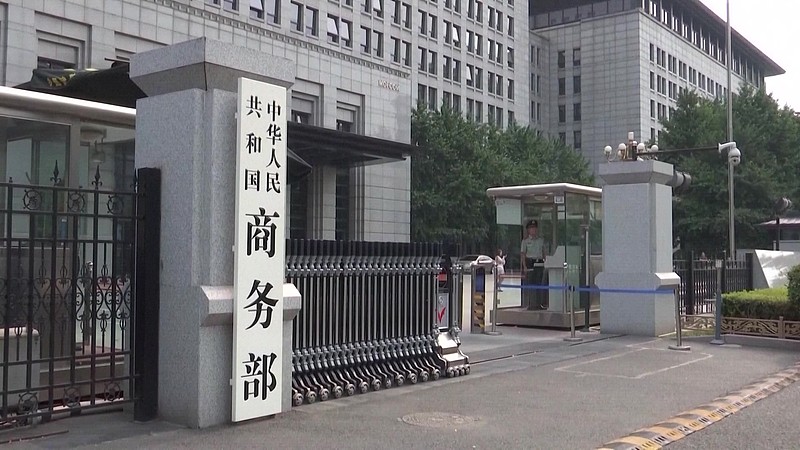

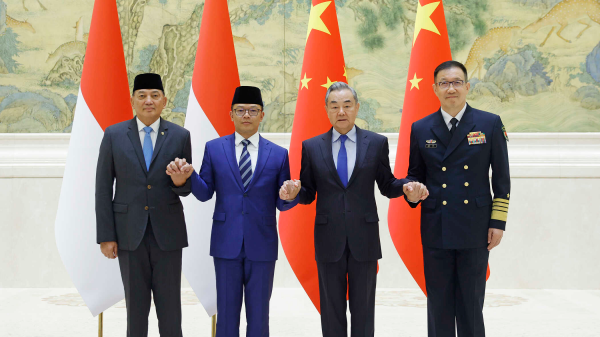
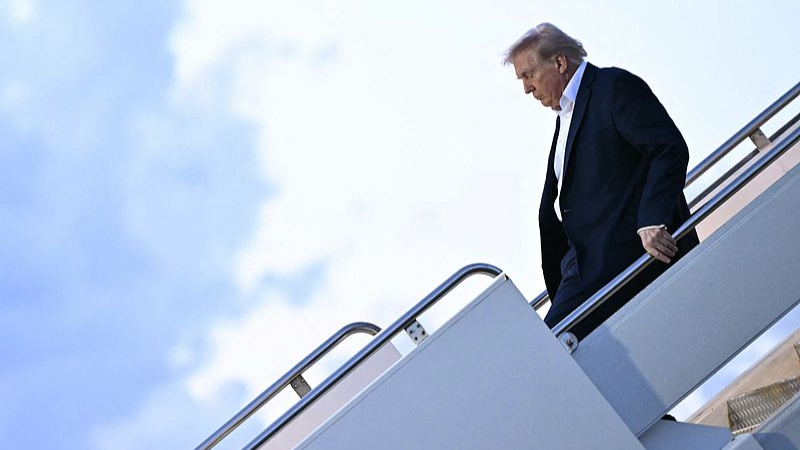
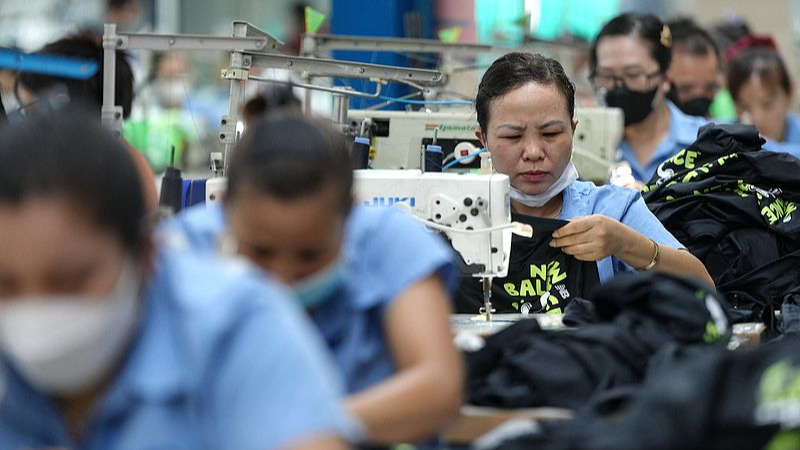
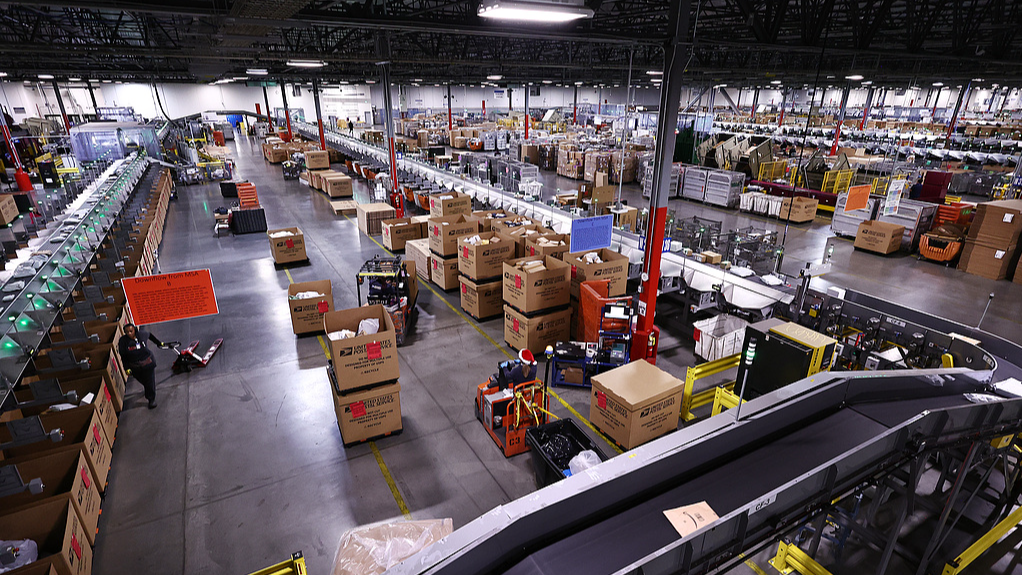





A worker at a Mexican currency exchange shop counts U.S. dollars, after President Donald Trump said he would temporarily lower new tariffs on many countries. /Jose Luis Gonzalez/Reuters
Another day, another Trump tariff u-turn, another day of open mouths among global economists.
U.S. President Donald Trump's stunning decision to pause most of the hefty duties he had just imposed on dozens of countries brought relief to battered global markets and anxious European leaders, even as he ratcheted up a seemingly deliberate trade war with China.
Trump's turnabout, which came less than 24 hours after steep new tariffs kicked in on most trading partners, followed the most intense episode of financial market volatility since the early days of the COVID-19 pandemic.
U.S. stock indexes leapt higher on the news, and the relief continued into Asian and European trading on Thursday.
Before Trump's U-turn, the upheaval had erased trillions of dollars from stock markets and led to an unsettling surge in U.S. government bond yields that appeared to catch the U.S. president's attention.
"I thought that people were jumping a little bit out of line, they were getting yippy, you know," Trump told reporters after the announcement, referring to the jitters sportspeople sometimes get.
But while European Commission chief President Ursula von der Leyen and other European leaders welcomed Trump's latest move and said they hoped for constructive negotiations, China rejected what it called threats and blackmail from Washington.
There were also calls from domestic political opponents into whether Trump or his top team should be investigated, amid accusations of insider trading and market manipulation.
Workers on a production line manufacturing bottle caps for export at a factory of a packaging company in Donghai county of Lianyungang, Jiangsu province, China. China Daily via Reuters
What has been the international response to Trump's tariff pause?
China
Trump pointedly excluded China from his tariff hiatus. The increase of tariffs on Chinese imports to 125 percent from the 104 percent level kicked in on Wednesday.
China will "follow through to the end" if the U.S. insists on its own way, Commerce Ministry spokesperson He Yongqian told a regular press briefing. China's door was open to dialogue, but this must be based on mutual respect, the ministry said.
"The U.S. cause doesn't win the support of the people and will end in failure," China's Foreign Ministry spokesperson Lin Jian added.
"We don't back down," Mao Ning, another Foreign Ministry spokesperson, posted earlier on X on Thursday.
The EU
On Thursday morning, EU chief Von Der Leyen announced the bloc would pause its first countermeasures against Trump's tariffs for 90 days.
The EU was due to launch counter-tariffs on about 21 billion euros of U.S. imports from next Tuesday in response to Trump's 25 percent tariffs on steel and aluminium. It is still assessing how to respond to U.S. car tariffs and the broader levies.
Von der Leyen said if negotiations with the U.S. were unsuccessful, the bloc's countermeasures would kick in. "All options remain on the table," she declared.
Canada
Prime Minister Mark Carney on Wednesday welcomed U.S. President Donald Trump's 90-day pause on some tariffs charged on trading partners.
"The pause on reciprocal tariffs announced by President Trump is a welcome reprieve for the global economy," Carney said in a post on X.
However, a White House official said the U.S. tariffs on goods imported from Mexico and Canada will not be affected by the 90-day pause on tariffs.
The U.S.'s 25 percent tariff on goods it imports from Mexico and Canada that are not covered under the region's USMCA trade pact remains in effect, the official said, adding that energy and potash from the two countries will also continue to be tariffed at 10 percent.
ASEAN
Southeast Asian countries are pressing for dialogue with the United States on trade tariffs and will not impose retaliatory measures, economic ministers of the regional bloc ASEAN said on Thursday.
Before the tariff pause announcement six of nine Southeast Asian countries targeted by the U.S. administration were slapped with much bigger-than-expected tariffs of between 32 percent and 49 percent.
By comparison, the level for the European Union was 20 percent, Japan's was 24 percent and India's 27 percent.
"We express our common intention to engage in a frank and constructive dialogue with the U.S. to address trade-related concerns. Open communication and collaboration will be crucial to ensuring a balanced and sustainable relationship," the Association of Southeast Asian Nations' economic ministers said in a statement, which expressed concern about the tariffs and their impact.
Germany
Chancellor-in-waiting Friedrich Merz said that U.S. President Donald Trump's decision to pause planned tariff increases for most countries was a testament to EU unity.
Asked about Trump's reversal in an interview with German broadcaster RTL, Merz said the announcement was a "reaction to the determination of the Europeans."
Merz separately told public broadcaster ARD that he and Trump would "see each other soon" although no date was yet set for his first visit to Washington once he becomes chancellor.
He said that, when the meeting does happen, he did not want to speak "solely for Germany" and will coordinate his approach with other European leaders.
France
"It's good news, but we must remain calm," Economy Minister Eric Lombard told LCI television, saying he hoped to find "a new agreement" with the Americans.
The French government has cut its growth forecast for 2025 because of the uncertainty over world trade, Lombard added.
Liquors from overseas are displayed at a store in New York City, U.S. /Jeenah Moon/Reuters
UK
Britain will "coolly and calmly" continue to negotiate with the United States on a trade deal, a Downing Street spokesperson said in response to the U.S. tariff pause.
"A trade war is in nobody's interest. We don't want any tariffs at all, so for jobs and livelihoods across the UK we will coolly and calmly continue to negotiate in Britain's interests," the spokesperson said.
Spain
Spanish Prime Minister Pedro Sanchez said on Thursday Trump's decision paved the way to possible talks, though he remained cautious about the details.
"The measure announced by the U.S. administration, pending the exact nuances of its implementation, seems to open the door to negotiation and thus to an agreement between countries," he said in a speech during an official visit in Vietnam.
U.S. Democrats
U.S. Senator Adam Schiff has called on Congress to investigate whether President Donald Trump engaged in insider trading or market manipulation with his tariff pause that caused stock prices to skyrocket.
Schiff, Senator for California Democrat, told TIME: "I'm going to do my best to find out" if there was illegality. "Family meme coins and all the rest of it are not beyond insider trading or enriching themselves. I hope to find out soon."
Democratic Senator for Virginia, Tim Kaine, told TIME: "When my own barber asks me whether Donald Trump is selling short or doing this to try to make money for himself, it shows that a lot of people are pretty suspicious about what's going on."